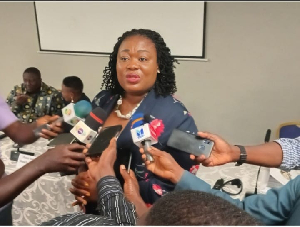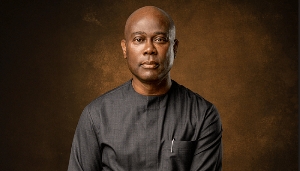The Deputy Attorney-General, Diana Asonaba Dapaah, has called for intensified strategic alliances, networking, and collaborations among institutions and organizations in West Africa to rid the region of money laundering and terrorist financing.
According to her, West Africa has been confronted with a grave economic concern due to the raging issue of money laundering and its related financing of terrorism.
This, she said, presents a challenging environment that demands our constant attention and steadfast commitment.
"Apart from the integrity of complicit financial institutions being damaged, money laundering and terrorism financing have dire consequences on the region's foreign direct investments.
I know most countries in our region have established comprehensive anti-money laundering regimes to fight this scourge. Nonetheless, having our CSOs take the rightful place at centre stage, with all other relevant stakeholders, is imperative as their voices have an effect and reach out to the far and near," she said.
She observed that the criminals behind these activities are constantly changing their tactics.
"They are very innovative and keep changing their tactics and methods of perpetration. The routine innovation by these perpetrators to evade scrutiny and combat demands our continuous and, what I believe, should be a commensurate aliveness to fight and overcome their plots and operations."
The Deputy Attorney-General was speaking at the opening day of a 3-day Regional Sensitization Workshop on Anti-Money Laundering and Counter-Financing of Terrorism (AML/CFT) designed for Civil Society Organizations (CSOs) in West Africa, currently underway in Accra.
The event is running from June 4 to June 6, 2024, at the Fiesta Royale Hotel.
The workshop aims to achieve two primary objectives: firstly, to educate civil society on the experiences and knowledge surrounding AML/CFT issues within the sub-region; and secondly, to enhance the capacity of CSOs, thereby empowering them to take a proactive role in combating money laundering and terrorist financing.
She commended GIABA for actively engaging and involving CSOs in the fight against ML and FT.
"The unique impact that CSOs bring to bear on AML and CFT cannot be overemphasized. And, strangely enough, this also means that CSOs tend to be the target of these crimes' perpetrators.
...They come in subtle ways, particularly through your grants and donor funding. And so, I'm here to implore all of you to play your role in our discussion on this subject matter.
Also very key is the necessary due diligence that we ought to establish within our framework as CSOs. These criminals may come in different forms as the next persons who apply to work with you to support you as CSOs. They will not come wielding weapons but rather in those subtle forms.
I'm happy to see that on the program outline today, we have issues of ethical considerations, code of conduct, and also how to avoid the misuse of vulnerable NPOs," she underscored.
Mrs. Lucy Abebrese, who read a speech on behalf of the hosts, GIABA National Correspondent and Chief Executive Officer of Ghana's Financial Intelligence Centre, Kwaku Dua, said CSOs over the years have had a positive impact on the sustainable development of economies worldwide.
She added that this GIABA ECOWAS workshop for CSOs across the region is to re-echo their strategic importance so that participants will continue to actively participate and influence governments to apply focused and proportionate measures in a risk-based approach towards the subject matter of Money Laundering & Terrorist Financing.
She applauded GIABA for this commendable step in building the capacities of CSOs in the region, particularly at such an opportune time.
"We will brainstorm on common challenges that affect the effective delivery of your work in the face of fighting money laundering and terrorist financing.
This will go a long way to mitigate the unintended consequences of Rec 8 of the FATF Recommendations and our various national legislations.
In a lot of jurisdictions across the globe, including Ghana, CSOs' effective dialogue and strong advocacy with government and Central Banks have birthed specific legislations, financial products, other initiatives including representation on statutory boards of Directors to facilitate CSOs' work while strengthening the legal and institutional framework of countries," she said.
She said CSOs are considered the wheels that drive the economy through impactful advocacy on policies, governments, and other interventions.
"A robust CSO is an essential ingredient for a thriving democracy, whether it exists to provide advocacy, technical inputs, capacity building, service delivery, social function, or representation. They are indeed a partnership for progress.
GIABA was established in December 2000 as an ECOWAS specialized institution and later became an associate member of the Financial Action Task Force (FATF), and FATF Style Regional Body (FSRB) with the mandate to, among others:
i) Facilitate and ensure that Member States adopt adequate measures against ML and FT, in line with acceptable international practices and standards. These are based on the FATF 40 Recommendations, with specific regional peculiarities considered.
ii) Provide a forum for dialogue and share experiences among the Member States, thus creating strong intra-regional cooperation.
iii) Organize self-evaluations (ongoing monitoring) and Mutual Evaluations of compliance by the Member States, using FATF Methodology.
iv) Help Member States establish and implement robust and functioning AML/CFT regimes (coordination bodies, legislation, FIUs, MLA treaties, training, etc.)
General News of Wednesday, 5 June 2024
Source: GIABA Journalists Network, Ghana Chapter













